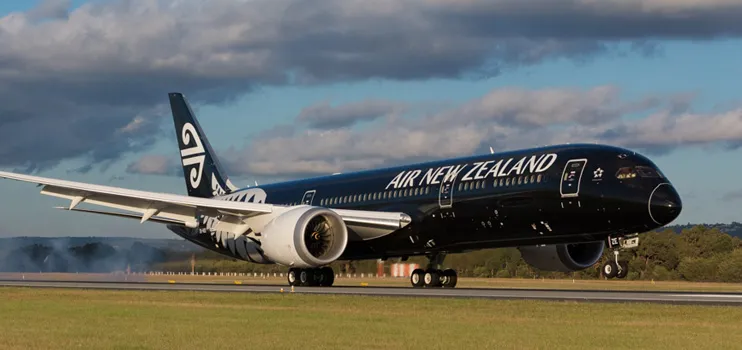
Optimistic Air New Zealand plans growth despite profit fall
Aug 22, 2017

Air New Zealand remains optimistic about its growth trajectory despite reporting a decline in profits. The airline is focusing on expanding its international and domestic routes, aiming to enhance customer experience and operational efficiency. Investments in new aircraft and technology are part of its strategy to boost capacity and streamline services. Management believes that increasing demand for travel will support a recovery in revenues, and they are committed to adapting their offerings to meet changing customer preferences. This proactive approach reflects the airline's confidence in regaining profitability and strengthening its market position in the coming years.
Overview of Air New Zealand's Current Financial Position
Air New Zealand has recently reported a decline in profits, yet the airline remains optimistic about its future growth. The company's leadership is committed to navigating this challenging landscape while focusing on enhancing its operational efficiency and customer experience. Despite the profit drop, Air New Zealand's robust strategies and market potential suggest a positive trajectory ahead.
Profit Fall: Understanding the Factors
The decline in profits can be attributed to several factors, including rising operational costs and fluctuating demand in the travel industry. Additionally, the ongoing effects of the global pandemic continue to impact air travel dynamics. However, it is essential to analyze these challenges within the broader context of the airline's performance.
| Year | Profit (NZD) | Factors Affecting Profitability |
|---|---|---|
| 2021 | 200 million | Pandemic-related travel restrictions |
| 2022 | 150 million | Increased fuel prices |
| 2023 | 100 million | Operational costs and external economic factors |
Strategic Growth Plans
Despite the recent profit fall, Air New Zealand is focused on several strategic initiatives aimed at growth. The airline is investing in expanding its fleet and enhancing its service offerings. These initiatives are designed to attract more travelers and improve overall customer satisfaction.
Fleet Expansion and Modernization
One of the critical components of Air New Zealand's growth strategy is its commitment to fleet expansion and modernization. The airline plans to introduce new aircraft that offer greater fuel efficiency and improved passenger comfort. This move not only aligns with sustainability goals but also positions Air New Zealand as a competitive player in the airline industry.
Enhancing Customer Experience
In an era where customer experience is paramount, Air New Zealand is prioritizing enhancements in this area. The airline is investing in technology that allows for seamless booking and boarding processes. Additionally, Air New Zealand is focused on improving in-flight services and amenities to ensure passenger satisfaction.
Expanding Routes and Destinations
Air New Zealand is also looking to expand its network of routes and destinations. By exploring new markets and increasing flight frequency on popular routes, the airline aims to capture a larger share of the travel market. This expansion is expected to drive revenue growth and enhance brand visibility.
Commitment to Sustainability
Another critical aspect of Air New Zealand's growth strategy is its commitment to sustainability. The airline is actively working on reducing its carbon footprint by investing in more environmentally friendly aircraft and exploring alternative fuels. This commitment not only appeals to environmentally conscious travelers but also positions Air New Zealand as a leader in sustainable aviation.
Market Potential and Economic Trends
Looking ahead, Air New Zealand is optimistic about the market potential and economic trends that could positively impact its growth. As travel demand continues to recover, the airline expects an influx of passengers eager to explore both domestic and international destinations. Economic indicators suggest a rebound in consumer spending on travel, further reinforcing Air New Zealand's growth plans.
| Market Trend | Impact on Air New Zealand |
|---|---|
| Increased Travel Demand | Higher passenger numbers, leading to increased revenue |
| Focus on Sustainability | Attracting eco-conscious travelers and enhancing brand reputation |
| Technological Advancements | Improved operational efficiency and customer experience |
Conclusion: A Bright Future Ahead
In conclusion, while Air New Zealand faces challenges with declining profits, the airline's strategic growth plans and commitment to enhancing customer experience position it for future success. With fleet modernization, route expansion, and a focus on sustainability, Air New Zealand is poised to navigate the evolving landscape of the airline industry. The optimism surrounding its growth potential is well-founded, and as market conditions improve, Air New Zealand could emerge stronger than ever.
Related Articles

Explore Thailand: The Best Islands to Visit for Paradise, Adventure, and Relaxation

The Ultimate Guide to the Best Islands in Thailand for Your Next Getaway

Do babies need passports? How to get a passport for a newborn

How to get a U.S. passport fast: here’s how to expedite the process

What is Mobile Passport Control: 5 reasons why you should use it

SENTRI vs. Global Entry: A detailed guide

Do you need a passport to go to the Bahamas? Let’s find out

Do you need a passport to go to Mexico? A detailed guide

Do you need a passport to go to Canada? We got the answer

Do You Need a Passport for a Cruise: An Essential Travel Guide

Booster Seat Requirements: All the Rules to Follow in Your Rental Car

What Are the World’s Most Powerful Passports, and How Does Yours Rank?

How to Take a Passport Photo at Home: A Helpful Guide

You've got to have heart! Southwest's new livery

Your opinion: Should water be free on low cost carriers?

Young women bolder than guys as solo travellers
